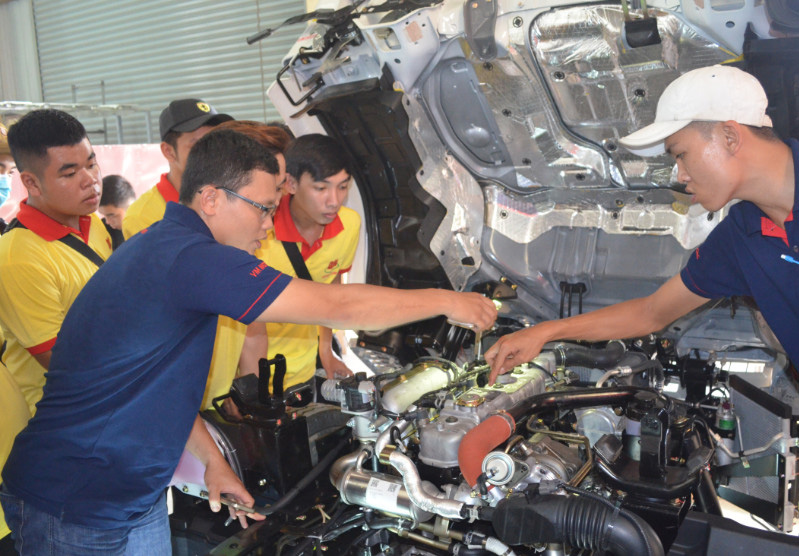
(HBO) - Nguyen Duc Cuong, Deputy Director of the Department of Labour, Invalids and Social Affairs of Hoa Binh province, said attention has been paid to career orientation and vocational training. Vocational training has been incorporated with demand of businesses and society, he said, adding that the number of high school graduates registering for vocational training has increased in recent years.
 Hoa Binh College
of Technology and Technique maintains auto repair classes that have attracted
crowds of students.
Hoa Binh College
of Technology and Technique maintains auto repair classes that have attracted
crowds of students.
There are about 9,000 high school graduates in Hoa Binh each year. Of whom,
only about 40 percent register for university and college entrance exams and
the remainder pursue vocational colleges and schools.
Schools
for elementary and intermediate vocational training admit around 8,500 students
each year, Cuong cited a report of the provincial Department of Education and
Training.
Besides, about 1,500 students work for factories based in Hoa Binh after they
complete high school education, and 8,000 are recruited by companies outside
the province.
Many policies in support of vocational training have been implemented
effectively in both public and private sectors.
Vocational schools at the elementary and intermediate levels have been opened
in localities in Hoa Binh over the past years. Children of poor and near-poor
households have received financial support to cover their study. These schools
offer such majors as electricity, mechanics and electronics, among others.
The provincial People’s Committee has also rolled out policies to support
vocational training for labourers at industrial parks. Accordingly, businesses
with 10-100 labourers will get 300,000 VND per employee, those with 100-less
than 1,000 workers will receive 500,000 per worker, and firms with more than
1,000 labourer will get 1 million VND per employee. The move aims to improve
the quality of human resources.
To improve the efficiency of vocational training in tandem with job creation,
the provincial Party Committee’s Standing Board on March 14, 2018 issued
Directive No. 38-CT/TU on enhancing the leadership of the Party towards
vocational training in Hoa Binh.
Under the document, Party committees, authorities, fatherland fronts and
political-social organisations at all levels have been asked to better their performance
in forecasting demand for human resources in each locality and the province at
large, and putting forth annual enrollment plans and training programmes for
each training institution.
They were also urged to build and duplicate effective vocational training
models, mobilise the participation of all social resources in vocational
training, while reviewing and re-arranging the network of vocational training
institutions in an effort to improve training quality.
Training should target demand of the labour markets both at home and abroad, as
well as the generation of stable jobs, and social welfare, the document says./.
In the spirit of "Party members go first, the people follow”, all households of Party members in the Doan Ket sub-region in Da Bac town, Da Bac district, voluntarily removed gates and fences, and donated land when the road expansion project passed through their properties. Inspired by their example, 68 households in the sub-region quickly followed suit, contributing over 1,400 sq.m of residential and perennial cropland to widen the main road through the residential area. The exemplary role of Party members in Doan Ket stands as a shining example of studying and following President Ho Chi Minh’s thought, morality, and lifestyle.
The Hoa Binh provincial People's Committee held a monthly meeting on May 29 to assess the implementation of socio-economic development tasks in the first six months of 2025, the progress of key projects, and some other important issues.
During his lifetime, President Ho Chi Minh always expressed his deep affection and special concern for children and youth. He once emphasized: "Caring for and educating children well is the responsibility of the entire Party and the entire people”; "First of all, the family (i.e. grandparents, parents, siblings) must do this job well”. "the Party Committees…, the Children’s Committee, the Youth Union, the education sector, and all related organizations must have specific plans to ensure children grow healthier and more progressive”. His teachings has been remaining valuable and serving as the guiding principles in the work of protecting, caring for, and educating children. In line with this ideology, Hoa Binh Province has continuously been prioritizing and investing resources in the well-being of children in recent years.
Mr. Nguyen Phi Long, the alternate Member of the Party Central Committee and Secretary of the Provincial Party Committee chaired the meeting of the Standing Committee of the Provincial Party Committee to provide opinions on several investment projects within the province. There was the attendance of Ms. Bui Thi Minh, the Permanent Deputy Secretary of the Provincial Party Committee and Chairwoman of the Provincial People’s Council; Mr. Bui Đuc Hinh, the Deputy Secretary of the Provincial Party Committee and Chairman of the Provincial People’s Committee and other members of the Standing Committee; the leaders from other departments, agencies, and some localities.
The Standing Board of the Vietnam Fatherland Front (VFF) Committee of Hoa Binh province held a meeting on May 28 to honour outstanding village elders, village heads, and reputable individuals from local ethnic minority and religious communities.
In mid-May, the provincial Museum organised an exhibition named "Duoi la co Dang Cong san Viet Nam quang vinh” (Under the flag of the glorious Communist Party of Vietnam). This meaningful activity took place in the joyful atmosphere to celebrate the country's major holidays and the Party congresses at all levels for the 2025-2030 term, towards the 14th National Party Congress.



 Hoa Binh College
of Technology and Technique maintains auto repair classes that have attracted
crowds of students.
Hoa Binh College
of Technology and Technique maintains auto repair classes that have attracted
crowds of students.